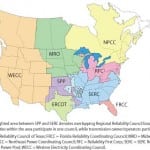Widespread efforts aimed at reducing carbon emissions and increasing the use of renewables for the generation of electricity will fundamentally determine the future course of electric reliability across North America, the North American Electric Reliability Corp. (NERC) said in a recently released report.
“We are concerned that, when viewed from a continent-wide perspective, current climate initiatives do not adequately address key reliability objectives, particularly the need for a strong and robust transmission system,” said Rick Sergel, president and CEO of the quasi-public agency.
The “Special Report on Electric Industry Concerns on Reliability Impacts of Climate Change Initiatives” (PDF) identifies several key reliability issues associated with climate change initiatives that will need to be addressed as these policies progress, including those that follow.
Broad-scale fuel switching from coal to natural gas. Coal-fired generation currently provides approximately 50% of North America’s electric capacity. Retirements of coal-fired plants over a short timeline could result in the loss of generation needed to support the integrity of the bulk power system and thus severely impact reliability across the continent, especially in those regions heavily dependent on the fuel. The broad-scale replacement and relocation of generating plants from current coal sites to sites that would be suitable for new or expanded natural gas–fired plants would require significant upgrades to existing transmission infrastructure.
Transmission infrastructure and planning mechanisms. The existing bulk transmission network is inadequate to reliably deliver power from new renewable resources to demand centers. Innovative planning and operational mechanisms will be needed as states and provinces attempt to deliver “clean energy” over already heavily loaded transmission lines to meet renewable portfolio standard requirements.
Demand-side resources. Managing growing demand will be critical to meeting both climate and reliability goals, making demand-side resources a critical component of the resource mix. Dispatchable demand response will be particularly important, as it adds needed system flexibility and supports the integration of new variable generation such as wind power.
National climate change policy in the U.S. A decision on national climate change policy is needed in the U.S. to provide regulatory certainty and support for industry action. “Delay on this important policy is negatively impacting both reliability and climate objectives,” NERC said.
Source: NERC









